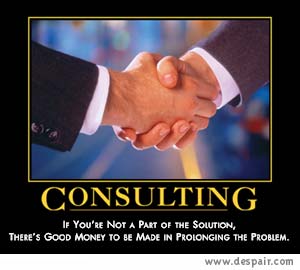Wednesday, December 27, 2006
Strategic Planning: Should you use a consulting firm or an Industry Analyst?
Many industry analyst firms also provide consulting services to their clients on strategic initiatives...

Imagine you want to align better and start embracing the notion of the Voice of the Customer and you hire an industry analyst to do so, they on average will charge an hourly rate in the $300 range. No where on the Internet is any thoughtful analysis as to what you get for higher hourly rates than you would see from typical consulting firms.
Some of the obvious advantages to going with an industry analyst over a consulting firm for strategy includes, but is not limited to:
It is my thought that hiring an industry analyst to assist with strategy in some domains simply makes sense. While I haven't done so in the past, I hope to pitch this notion at work, at every opportunity. Hopefully, others within the blogosphere that have went down this path, can trackback and share their experiences in this regard...

| | View blog reactions
Imagine you want to align better and start embracing the notion of the Voice of the Customer and you hire an industry analyst to do so, they on average will charge an hourly rate in the $300 range. No where on the Internet is any thoughtful analysis as to what you get for higher hourly rates than you would see from typical consulting firms.
Some of the obvious advantages to going with an industry analyst over a consulting firm for strategy includes, but is not limited to:
- Industry analysts tend to talk to more enterprises and therefore have more insight and visibility into what others are up to, while the consulting firm is limited to whomever hired them for the same/similar work in the past
- I haven't yet ran across an industry analyst firm that hires truckloads of Kindergartners (aka Freshers aka folks just out of college) to do all the work while a partner simply provides guidance. Usually analysts have years of industry experience and therefore you will get the most efficient output and not paying for junior folks to learn on your nickel.
- If you also have outsourced delivery of the strategy then choosing an analyst over a consulting firm is even better as they tend to on average have great presentation skills and even better writing skills than most folks in corporate America
- If you desire a strategy that is not cookie-cutter, then an analyst even if they don't have the personal experience is usually only one degree away from someone who does and won't be constrained necessarily by that persons availability as it may not be about billing like consulting firms. They can also go outside their firm for expertise a lot quicker.
- Insights from other analyst firms: Remember, you are now paying for consulting services not research services and therefore it is more than reasonable to expect that insights will be more than just previously formed opinions. You also need differing opinions in order to find the right answer for you. Otherwise the information provided may be too general in order to be applicable.
- Seek conflicting opinions: In the course of normal industry analyst work, they tend to publish only elements in which there is strong consensus where as the enterprise benefits the most by understanding where folks in the past have been diametrically opposed. This provides insight as to hurdles you may run into. Don't let industry analysts sanitize this stuff out.
- Define notation and format: While each analyst firm has their own style, it is important for you to define things such as expected page counts (don't go extreme here) along with particular notations you desire. For example, if you are stategizing on an policy administration system, maybe they should show the typical executive-level Visio diagrams as well as UML diagrams that further expand the detail
- Forbid discussions around products: If you talk about products other than what is currently in-house, you may be either paying twice in order to get product recommendations and/or they may be charging you for their own research that benefits others.
- Rethink NDA: Part of the dilemma that industry analysts face is what they can and can't talk about. On one hand, the enterprise wants to gain insight from them on what others are doing yet may not desire to share their own strategies. This model is simply not sustainable nor practical. Maybe the better answer is to hire the analyst firm to do strategy work with the commitment that they shall not disclose anything about your strategy for some period of time or at least until it is in production and then they will do a case study on how you were successful in implementing it. The enteprise benefits by gaining publicity while the analyst retains the ability to talk about it. Likewise, this will cause the analyst firm to avoid cookie cutter as they have better incentive to work harder because they may be part of the study itself.
It is my thought that hiring an industry analyst to assist with strategy in some domains simply makes sense. While I haven't done so in the past, I hope to pitch this notion at work, at every opportunity. Hopefully, others within the blogosphere that have went down this path, can trackback and share their experiences in this regard...




